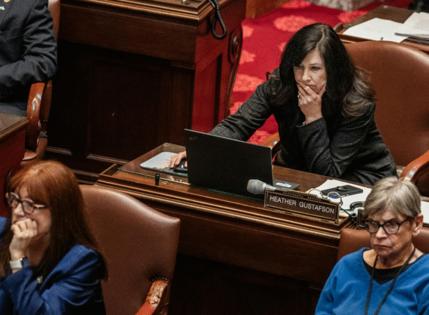Judge strikes down Minnesota trigger ban, warns spending bills have grown too sprawling
Published in News & Features
A Minnesota District Court judge on Monday struck down a state law that bans what are known as binary triggers on guns, ruling the way legislators tucked the change inside a massive budget bill was unconstitutional.
Binary triggers allow two bullets to be fired from a gun with one pull-and-release motion, and the Legislature outlawed the devices after they were used in deadly shootings of law enforcement in Burnsville and Fargo. Attorney General Keith Ellison plans to appeal to the court’s decision, a spokesman for his office said, arguing that binary triggers “dramatically increase the rate of fire and lethality of many firearms.”
The provision banning binary triggers was tucked into a 1,400-page spending and policy bill that was approved by Democrats in the closing minutes of the 2024 legislative session. The bill covered everything from health care to transportation, and Republicans complained the measure was thrown together in a chaotic rush to beat a midnight deadline.
A gun rights group sued the state and the Hennepin County Attorney’s Office over the ban in February, arguing the mega-bill violated a clause in the Minnesota Constitution that requires bills to embrace no more than one subject.
The massive bills have become common practice at the Capitol, and the ruling from Judge Leonardo Castro all but invites further challenges to the practice, long bemoaned by supporters of government transparency.
The Minnesota Gun Owners Caucus, which brought the suit, hailed the ruling as a victory against “backroom deals” made at the Legislature.
“It should at least put legislators on notice should they try to concoct similar omnibus bills in the future,” said Rob Doar, senior vice president for the group.
In his opinion, Castro wrote that “at best” the law “contains many non-germane parts, and at worst, has no identifiable common theme.”
Courts have largely blessed legislators’ increasing reliance on massive bills over the last 50 years, but Monday’s ruling could be a sign that legislators went too far with the 2024 bill.
Doar’s group implored Castro to invalidate the entire law. The judge invalidated the binary trigger ban and let the rest of the law stand but seemed to invite higher courts to knock it down entirely.
“This Court respectfully suggests ... if there has ever been a time for the ‘draconian result of invalidating the entire law,’ that time is now,” Castro wrote.
The state Supreme Court has historically declined to strike down entire omnibus bills out of respect for the Legislature, said retired Supreme Court Justice Paul Anderson.
But Anderson was also a critic of omnibus bills, writing in a concurrence in 2000 that merely severing unconstitutional pieces from a law wasn’t enough of a deterrent to legislators.
“I wanted to put a shot across the bow that this is not right,” Anderson told the Minnesota Star Tribune in July.
The ruling sets up a legal dilemma for the state, said David Schultz, a professor of political science at Hamline University and law professor at the University of St. Thomas who has written extensively about the single-subject rule.
An appeal could result in the ban being restored, or in the entire 1,400-page bill being struck down.
For now, Schultz said the ruling means the court has put some teeth back into the single-subject rule that dates back to the 1800s. Other states passed similar rules and legislators elsewhere are more careful to observe them, Schultz said.
“The whole idea was to prevent mischief and to give the public fair notice about what legislation is about,” Schultz said. “I think what the court is saying is we need to go back to some of these really basic premises, so that the public can actually figure out what’s going on at the Capitol.”
Castro also seemed to invite other parties to file suit over the bill, writing that enforcement of the rule will require hundreds of lawsuits to “hack off, piece by piece, its many offending portions.”
Doug Seaton, president of the Upper Midwest Law Center, which represented the Minnesota Gun Owners Caucus, said his group would “be happy to talk to anyone who would be willing to do that.”
_____
©2025 The Minnesota Star Tribune. Visit startribune.com. Distributed by Tribune Content Agency, LLC







Comments